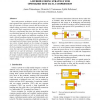Free Online Productivity Tools
i2Speak
i2Symbol
i2OCR
iTex2Img
iWeb2Print
iWeb2Shot
i2Type
iPdf2Split
iPdf2Merge
i2Bopomofo
i2Arabic
i2Style
i2Image
i2PDF
iLatex2Rtf
Sci2ools
123
click to vote
ITC
2003
IEEE
2003
IEEE
A Hybrid Coding Strategy For Optimized Test Data Compression
Store-and-generate techniques encode a given test set and regenerate the original test set during the test with the help of a decoder. Previous research has shown that runlength coding, particularly alternating run-length coding, can provide high compression ratios for the test data. However, experimental data show that longer run-lengths are distributed sparsely in the code space and often occur only once, which implies an inefficient encoding. In this study a hybrid encoding strategy is presented which overcomes this problem by combining both the advantages of run-length and dictionary-based encoding. The compression ratios strongly depend on the strategy of mapping don't cares in the original test set to zeros or ones. To find the best assignment an algorithm is proposed which minimizes the total size of the test data consisting of the encoded test set and the dictionary. Experimental results show that the proposed approach works particularly well for larger examples yielding ...
Hardware | ITC 2003 | Original Test | Test Data | Test Set |
Related Content
| Added | 04 Jul 2010 |
| Updated | 04 Jul 2010 |
| Type | Conference |
| Year | 2003 |
| Where | ITC |
| Authors | Armin Würtenberger, Christofer S. Tautermann, Sybille Hellebrand |
Comments (0)

